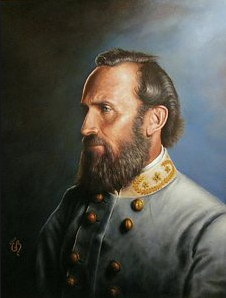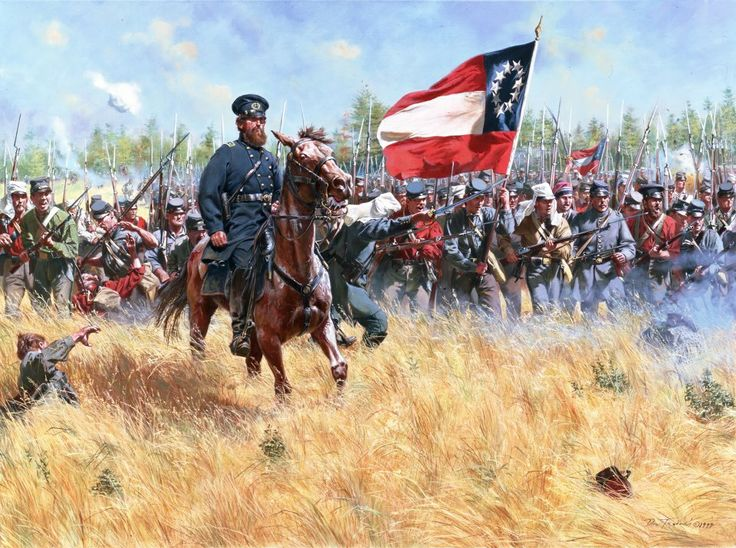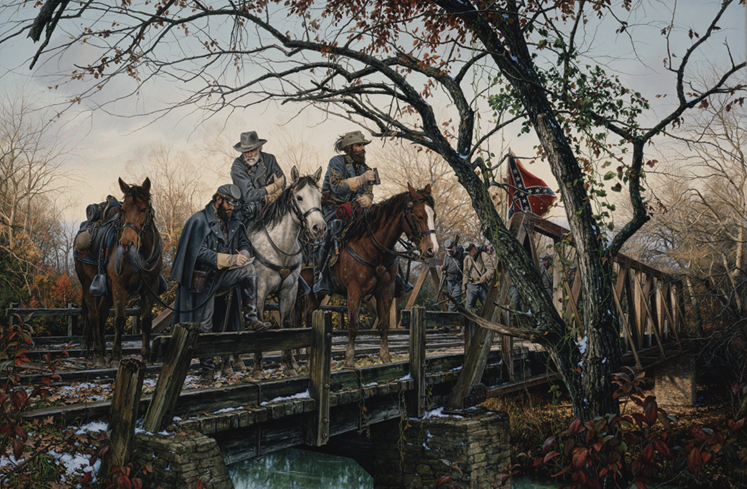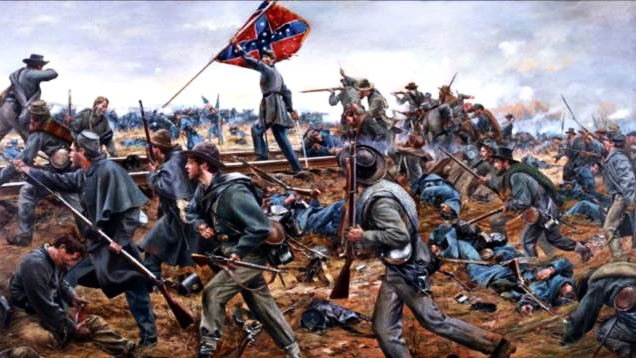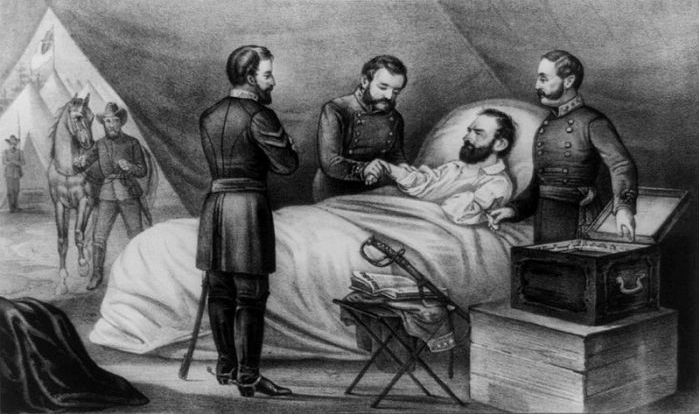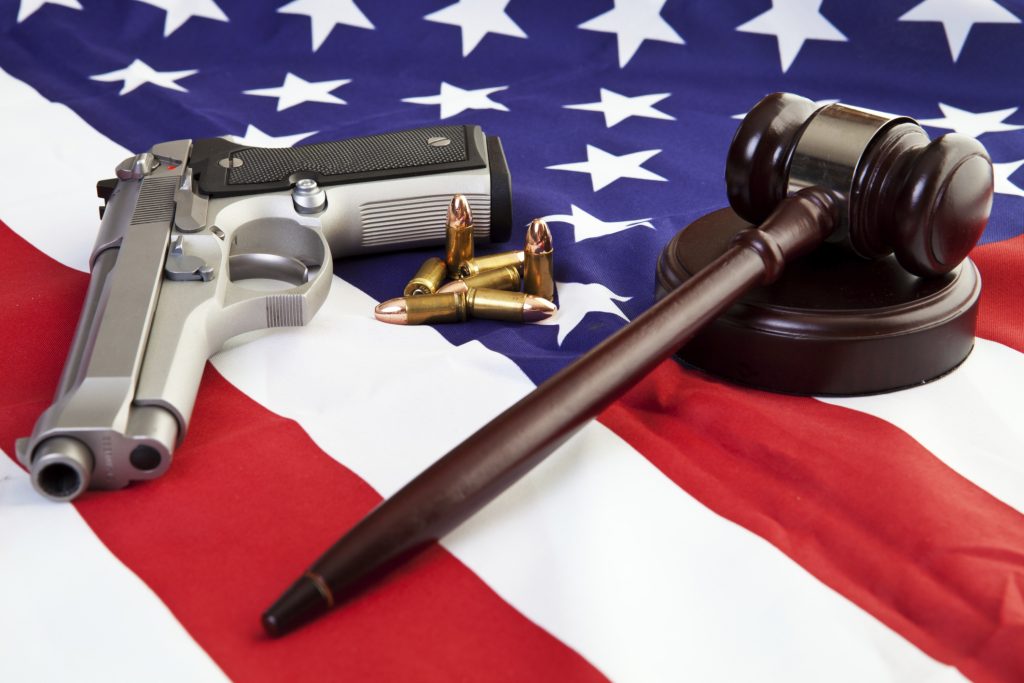Editor’s note: The following is extracted from Hero Tales of American History, by Henry Cabot Lodge and Theodore Roosevelt (published 1895). Roosevelt is the author of this chapter. Though plainly writing from the victorious Northern perspective, Roosevelt imbues his essay with a chivalrous admiration for Confederate rectitude and bravery. It is a fine example of the unspoken “gentleman’s agreement” between high-minded Yankees and Southrons to let bygones be bygones, a truce that lasted until the Left began its merciless culture war against Southern heritage.
The Civil War has left, as all wars of brother against brother must leave, terrible and heartrending memories; but there remains as an offset the glory which has accrued to the nation by the countless deeds of heroism performed by both sides in the struggle. The captains and the armies that, after long years of dreary campaigning and bloody, stubborn fighting, brought the war to a close, have left us more than a reunited realm. North and South, all Americans, now have a common fund of glorious memories. We are the richer for each grim campaign, for each hard-fought battle. We are the richer for valor displayed alike by those who fought so valiantly for the right, and by those who, no less valiantly, fought for what they deemed the right. We have in us nobler capacities for what is great and good because of the infinite woe and suffering, and because of the splendid ultimate triumph. We hold that it was vital to the welfare, not only of our people on this continent, but of the whole human race, that the Union should be preserved and slavery abolished; that one flag should fly from the Great Lakes to the Rio Grande; that we should all be free in fact as well as in name, and that the United States should stand as one nation–the greatest nation on the earth. But we recognize gladly that, South as well as North, when the fight was once on, the leaders of the armies, and the soldiers whom they led, displayed the same qualities of daring and steadfast courage, of disinterested loyalty and enthusiasm, and of high devotion to an ideal.
The greatest general of the South was Lee, and his greatest lieutenant was Jackson. Both were Virginians, and both were strongly opposed to disunion. Lee went so far as to deny the right of secession, while Jackson insisted that the South ought to try to get its rights inside the Union, and not outside. But when Virginia joined the Southern Confederacy, and the war had actually begun, both men cast their lot with the South.
It is often said that the Civil War was in one sense a repetition of the old struggle between the Puritan and the Cavalier; but Puritan and Cavalier types were common to the two armies. In dash and light-hearted daring, Custer and Kearney stood as conspicuous as Stuart and Morgan; and, on the other hand, no Northern general approached the Roundhead type – the type of the stern, religious warriors who fought under Cromwell – so closely as Stonewall Jackson. He was a man of intense religious conviction, who carried into every thought and deed of his daily life the precepts of the faith he cherished. He was a tender and loving husband and father, kindhearted and gentle to all with whom he was brought in contact; yet in the times that tried men’s souls, he proved not only a commander of genius, but a fighter of iron will and temper, who joyed in the battle, and always showed at his best when the danger was greatest. The vein of fanaticism that ran through his character helped to render him a terrible opponent. He knew no such word as falter, and when he had once put his hand to a piece of work, he did it thoroughly and with all his heart. It was quite in keeping with his character that this gentle, high-minded, and religious man should, early in the contest, have proposed to hoist the black flag, neither take nor give quarter, and make the war one of extermination. No such policy was practical in the nineteenth century and in the American Republic; but it would have seemed quite natural and proper to Jackson’s ancestors, the grim Scotch-Irish, who defended Londonderry against the forces of the Stuart king, or to their forefathers, the Covenanters of Scotland, and the Puritans who in England rejoiced at the beheading of King Charles I.
In the first battle in which Jackson took part, the confused struggle at Bull Run, he gained his name of Stonewall from the firmness with which he kept his men to their work and repulsed the attack of the Union troops. From that time until his death, less than two years afterward, his career was one of brilliant and almost uninterrupted success; whether serving with an independent command in the Valley, or acting under Lee as his right arm in the pitched battles with McClellan, Pope, and Burnside. Few generals as great as Lee have ever had as great a lieutenant as Jackson. He was a master of strategy and tactics, fearless of responsibility, able to instill into his men his own intense ardor in battle, and so quick in his movements, so ready to march as well as fight, that his troops were known to the rest of the army as the “foot cavalry.”
In the spring of 1863 Hooker had command of the Army of the Potomac. Like McClellan, he was able to perfect the discipline of his forces and to organize them, and as a division commander he was better than McClellan, but he failed even more signally when given a great independent command. He had under him 120,000 men when, toward the end of April, he prepared to attack Lee’s army, which was but half as strong.
The Union army lay opposite Fredericksburg, looking at the fortified heights where they had received so bloody a repulse at the beginning of the winter. Hooker decided to distract the attention of the Confederates by letting a small portion of his force, under General Sedgwick, attack Fredericksburg, while he himself took the bulk of the army across the river to the right hand so as to crush Lee by an assault on his flank. All went well at the beginning, and on the first of May Hooker found himself at Chancellorsville, face-to-face with the bulk of Lee’s forces; and Sedgwick, crossing the river and charging with the utmost determination, had driven out of Fredericksburg the Confederate division of Early; but when Hooker found himself in front of Lee he hesitated, faltered instead of pushing on, and allowed the consummate general to whom he was opposed to take the initiative.
Lee fully realized his danger, and saw that his only chance was, first to beat back Hooker, and then to turn and overwhelm Sedgwick, who was in his rear. He consulted with Jackson, and Jackson begged to be allowed to make one of his favorite flank attacks upon the Union army; attacks which could have been successfully delivered only by a skilled and resolute general, and by troops equally able to march and to fight. Lee consented, and Jackson at once made off. The country was thickly covered with a forest of rather small growth, for it was a wild region, in which there was still plenty of game. Shielded by the forest, Jackson marched his gray columns rapidly to the left along the narrow country roads until he was square on the flank of the Union right wing, which was held by the Eleventh Corps, under Howard. The Union scouts got track of the movement and reported it at headquarters, but the Union generals thought the Confederates were retreating; and when finally the scouts brought word to Howard that he was menaced by a flank attack he paid no heed to the information, and actually let his whole corps be surprised in broad daylight. Yet all the while the battle was going on elsewhere, and Berdan’s sharpshooters had surrounded and captured a Georgia regiment, from which information was received showing definitely that Jackson was not retreating, and must be preparing to strike a heavy blow.
The Eleventh Corps had not the slightest idea that it was about to be assailed. The men were not even in line. Many of them had stacked their muskets and were lounging about, some playing cards, others cooking supper, intermingled with the pack-mules and beef cattle. While they were thus utterly unprepared Jackson’s gray-clad veterans pushed straight through the forest and rushed fiercely to the attack. The first notice the troops of the Eleventh Corps received did not come from the pickets, but from the deer, rabbits and foxes which, fleeing from their coverts at the approach of the Confederates, suddenly came running over and into the Union lines. In another minute the frightened pickets came tumbling back, and right behind them came the long files of charging, yelling Confederates; With one fierce rush Jackson’s men swept over the Union lines, and at a blow the Eleventh Corps became a horde of panic-struck fugitives. Some of the regiments resisted for a few moments, and then they too were carried away in the flight.
For a while it seemed as if the whole army would be swept off; but Hooker and his subordinates exerted every effort to restore order. It was imperative to gain time so that the untouched portions of the army could form across the line of the Confederate advance.
Keenan’s regiment of Pennsylvania cavalry, but four hundred sabers strong, was accordingly sent full against the front of the ten thousand victorious Confederates.
Keenan himself fell, pierced by bayonets, and the charge was repulsed at once; but a few priceless moments had been saved, and Pleasanton had been given time to post twenty-two guns, loaded with double canister, where they would bear upon the enemy.
The Confederates advanced in a dense mass, yelling and cheering, and the discharge of the guns fairly blew them back across the work’s they had just taken. Again they charged, and again were driven back; and when the battle once more began the Union reinforcements had arrived.
It was about this time that Jackson himself was mortally wounded. He had been leading and urging on the advance of his men, cheering them with voice and gesture, his pale face flushed with joy and excitement, while from time to time as he sat on his horse he took off his hat and, looking upward, thanked heaven for the victory it had vouchsafed him. As darkness drew near he was in the front, where friend and foe were mingled in almost inextricable confusion. He and his staff were fired at, at close range, by the Union troops, and, as they turned, were fired at again, through a mistake, by the Confederates behind them. Jackson fell, struck in several places. He was put in a litter and carried back; but he never lost consciousness, and when one of his generals complained of the terrible effect of the Union cannonade he answered:
“You must hold your ground.”
For several days he lingered, hearing how Lee beat Hooker, in detail, and forced him back across the river. Then the old Puritan died. At the end his mind wandered, and he thought he was again commanding in battle, and his last words were:
“Let us cross over the river and rest in the shade.”
Thus perished Stonewall Jackson, one of the ablest of soldiers and one of the most upright of men, in the last of his many triumphs.

